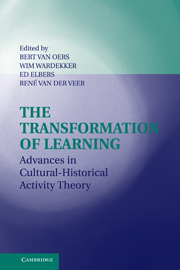Book contents
- Frontmatter
- Contents
- List of Contributors
- Preface
- INTRODUCTION
- SECTION ONE TENETS OF ACTIVITY THEORY
- SECTION TWO IDENTITY, DIVERSITY, AND INCLUSION
- SECTION THREE DYNAMICS OF ACTIVITY AND THE VARIATIONS OF LEARNING
- Introduction to Section Three: Learning in Social Settings: Challenges for Sociocultural and Activity Theory
- 15 Children's Learning through Participation in Institutional Practice: A Model from the Perspective of Cultural-Historical Psychology
- 16 Dialogue for Reasoning: Promoting Exploratory Talk and Problem Solving in the Primary Classroom
- 17 What Kinds of Tools and Resources Are Made Available to Students through Effective Guidance in a Student-Scientist Partnership Program?
- 18 Girls on the Sidelines: “Gendered” Development in Early Childhood Classrooms
- 19 Inscripting Predicates: Dealing with Meanings in Play
- 20 Pretend Play and Preschoolers
- Index
- References
Introduction to Section Three: Learning in Social Settings: Challenges for Sociocultural and Activity Theory
Published online by Cambridge University Press: 25 August 2009
- Frontmatter
- Contents
- List of Contributors
- Preface
- INTRODUCTION
- SECTION ONE TENETS OF ACTIVITY THEORY
- SECTION TWO IDENTITY, DIVERSITY, AND INCLUSION
- SECTION THREE DYNAMICS OF ACTIVITY AND THE VARIATIONS OF LEARNING
- Introduction to Section Three: Learning in Social Settings: Challenges for Sociocultural and Activity Theory
- 15 Children's Learning through Participation in Institutional Practice: A Model from the Perspective of Cultural-Historical Psychology
- 16 Dialogue for Reasoning: Promoting Exploratory Talk and Problem Solving in the Primary Classroom
- 17 What Kinds of Tools and Resources Are Made Available to Students through Effective Guidance in a Student-Scientist Partnership Program?
- 18 Girls on the Sidelines: “Gendered” Development in Early Childhood Classrooms
- 19 Inscripting Predicates: Dealing with Meanings in Play
- 20 Pretend Play and Preschoolers
- Index
- References
Summary
Section III presents six studies performed in a variety of learning contexts. De Groot Kim, van Oers, and Japiassu discuss diverse forms of children's play and their significance for development. Hedegaard, Rahm and her colleagues, and Rojas-Drummond and her colleagues deal with children's learning in formal contexts. The authors of the six chapters in this section differ in their approach to learning, in the scale of their presentation, the methods adopted, and the way they relate to sociocultural theory and activity theory. Despite their differences, however, the authors appear to share a commitment to further developing sociocultural and activity theory – in two respects. Firstly, they express a need to understand how children contribute to their own development. Children learn by participating in cultural activities; that means that children contribute to these activities and consequently to the creation of the conditions of their learning. A view on learning and instruction that considers adult-child relationships merely as a site for the transmission of culture seems to have been abandoned by the authors a long time ago. Learning, in contrast, is a constructive activity, in which children create something new. The challenge is to make this creative process visible. The second issue relates to the first one: if children contribute to the creation of the conditions of their learning, how does this influence their identity and their relationships with others?
- Type
- Chapter
- Information
- The Transformation of LearningAdvances in Cultural-Historical Activity Theory, pp. 289 - 293Publisher: Cambridge University PressPrint publication year: 2008



